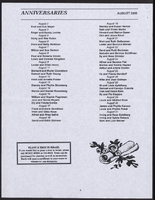Search the Special Collections and Archives Portal
Search Results

Valorie Vega interview, November 19, 2018: transcript
Date
Archival Collection
Description
Interviewed by Laurents Bañuelos-Benitez. Barbara Tabach also participates in the questioning. Valorie J Vega was born in raised in Los Angeles County. Her father, Fred Vega, was one of the first firefighters hired in the Los Angeles County area. Vega was one of three children, and remembers spending her childhood surrounded by family. In college, Vega began studying biology only to realize that she was better suited studying Spanish. Upon completion of her undergrad, Vega went on to earn a Master's in Spanish interpretation. As a result of her studies, Vega was able to secure a job in the Court Interpreter program in Las Vegas, moving here in 1978. Her position in the interpreter program, led her to pursue a degree in law which in turn led to a successful career as a lawyer and a judge.
Text

Floyd Jenne interview, 1996: transcript
Date
Archival Collection
Description
Jenne discusses his birth in Ogden, Utah in 1915, his early life in Northern Nevada in 1920s, and his later life in Boulder City, Nevada working as a reclamation ranger for the Bureau of Reclamation. Jenne begins the interviews discussing his work as a steel foundry worker and miner in McGill, Nevada, studying forestry, and enlisting in the Civilian Conservation Corps at Utah State University in 1934. Jenne then describes his experiences moving to Boulder City and working as a reclamation ranger. Other topics Jenne covers include providing security for notable Boulder City and Hoover Dam (Boulder Dam) visitors and patrolling the area. Lastly, Jeanne talks about the Boulder City Junior Chamber of Commerce, Boulder City's incorporation, and Boulder City law enforcement.
Text

Transcript of interview with Myoung-ja Lee Kwon by Claytee White, September 4, 2004
Date
Archival Collection
Description
Myoung-ja Lee Kwon began her life on the grounds of the Kyongbok Palace in Korea. In a country where education is valued, her father's occupation as a university professor meant that the family was highly honored, thus this palatial space allowed them live in a state of prosperity. But war changed these circumstances and in this interview Kwon vividly explains the family's evolution. In 1965, after graduation from Seoul National University she married and a year later, moved to the United State of America where she earned a Master's degree in Library Science in Provo, Utah. Her first professional position was at the University of Nevada Las Vegas as a cataloguer and after many promotions, became interim dean of UNLV Libraries. In 2001, she took the job as Dean of Libraries at California State East Bay Library, retiring in 2008. Currently, she serves as a special lecturer and discussion leader with the Fulbright Senior Specialist Program. During her 2009 visit to Korea, she pr
Text

Transcript of interview with Charlene Herst by Barbara Tabach, September 09, 2016
Date
Archival Collection
Description
In 2014, Charlene, n?e Friedkin, Herst retired from her state government career, settled into volunteer work, being a mother and grandmother, and being a grant writer for others. After thirteen years in Carson City, she came back home to Las Vegas. Charlene was eight years old when her parents, Patricia and Richard Friedkin, moved their family to Las Vegas from northern California. She remembers vividly the hot day that they arrived and moved into a rental house in the desert across from Woodlawn Cemetery. Her father, formerly in the grocery business, found work at Vegas Village. Two years later they moved ?into Las Vegas at the very edge?which was Oakey.? She recalls people she has known since those first years who have been instrumental in the growth of Las Vegas; the challenges of being a divorced single mother of four; and the career path that began with an invitation from Gene Greenberg to apply for a part time position at Channel 3, where he was sales manager. At Channel 3 she quickly went from part time to full-time. She started the Community Projects Board, which brought together nonprofit organizations together at the studio in the 1980s to identify and develop marketing campaigns that addressed social issues in the community. Initiatives included Baby Your Baby and Smoking Stinks. While working for Channel 3, she also attended UNLV and received a communications degree in 1995. In 1997 she worked at Sierra Health Services in public relations. Then in October 2001, Charlene started her career in state government as the Nevada State Health Division?s Manager of the Tobacco Program. Over the course of her thirteen year career with the state, she was promoted to positions that continued her dedication to improving the quality of life of all Nevadans. She was instrumental in the implementation of the Nevada Clean Indoor Air Act (2006); improving prevention services to women; reducing the rate of substance use and abuse in the state. The date of her retirement, October 10, 2014, was officially proclaimed in honor of Charlene Herst by Governor Brian Sandoval.
Text

Transcript of interview with Herb Tobman by Deborah Fischer, March 13, 1981
Date
Archival Collection
Description
Interview with Herb Tobman by Deborah Fischer on March 13, 1981. In this interview on the subject of gambling, Herb Tobman talks about moving to Las Vegas while working for Standard Oil as a tire, battery and accessory salesman, then began working for the Moulin Rouge as the general manager in 1955. He gives a description of the hotels on Las Vegas Boulevard and downtown, and the "western" nature of town where people rode horses. Tobman then discusses the types of gambling that were popular: slot machines, blackjack and craps. He also talks about the accommodations (hotels and motels) available in the 1950s, transportation to and from the area, entertainment, and the economy. The interviewer continually asks Tobman to compare 1950s Las Vegas with 1980s Las Vegas in terms of the gambling environment.
Text

Interview with Raymond Chester Harbert, April 3, 2006
Date
Archival Collection
Description
Text

Interview with Patricia George, with Virginia Sanchez, September 11, 2004
Date
Archival Collection
Description
Access note: May not quote in any form without written permission from interviewee
Text

Interview with Virginia Sanchez, with Patricia George, September 11, 2004
Date
Archival Collection
Description
Access note: May not quote in any form without written permission from interviewee
Text

Interview with Anna (Anne) Welsh, June 23, 2004
Date
Archival Collection
Description
Text

